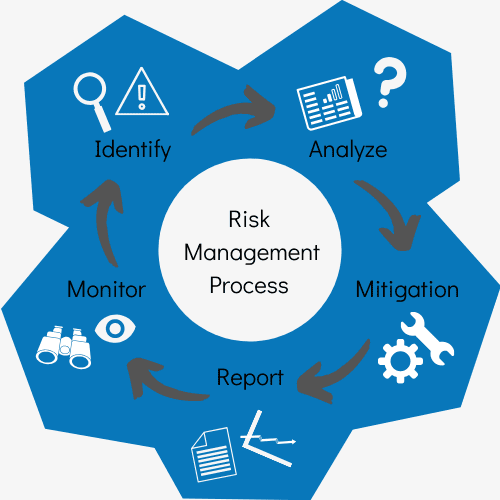The Important Importance of Risk Management in Getting Organizational Objectives
In the quickly progressing company landscape, the ability to browse uncertainty has actually ended up being a crucial. This is where Risk Management steps in, providing an organized approach to determining, analyzing, and mitigating potential obstructions to advance. It's greater than simply a safety step - it's a critical device, cultivating resilience and development. As we explore the important duty of Risk Management in attaining organizational goals, one can't assist yet question: how does this translate into real-world success?
Comprehending the Idea of Risk Management in Company

The Important Duty of Risk Management in Strategic Preparation
Incorporating Risk Management into strategic preparation acts as a protect for companies, securing their lasting plans with a strong foundation of preparedness and durability. It runs as the organization's radar, detecting prospective dangers and susceptabilities that can disrupt the course in the direction of achieving their stated goals. Risk Management provides a framework for anticipating uncertainties and creating ideal responses, making sure the company's survival and success even in the face of hardship. By integrating Risk Management into tactical planning, organizations can transform these uncertainties into opportunities for growth and technology. This critical interweaving of Risk Management promotes flexibility, making companies more durable and enabling them to browse the ever-changing business landscape confidently. Risk Management ends up being a crucial tool in critical planning, crucial in safeguarding lasting success.

Techniques for Identifying, Assessing, and Prioritizing Risks
The procedure starts with Risk recognition, using devices such as SWOT evaluation, which helps in identifying potential threats and chances. Next off, Risk assessment is carried out to ascertain the potential effect and probability of each Risk. Dangers are prioritized based on their possible influence and probability, enabling companies to focus their resources on high-priority threats.
Protecting Business Workflow With Efficient Risk Management
In the company landscape laden with uncertainties, effective Risk Management plays an essential role in guarding business operations. By recognizing and assessing potential dangers, Risk Management enables companies to establish durable contingency plans. Companies need to spend in comprehensive Risk Management strategies to secure their procedures.

Converting Possible Dangers to Opportunities: The Power of Risk Management
While potential dangers could originally show up as obstacles to business success, effective Risk Management can change them into possibilities. A positive strategy to risk Management includes determining, assessing, and prioritizing threats to create methods that transform them into prospective advantages. This process necessitates the advancement of a risk-aware society within the company, urging people to see threats as prospective stimulants for modification and growth, instead of simple threats. importance of risk management. Via this lens, prospective threats come to be chances to innovate, enhance procedures, and strengthen resilience. Therefore, by leveraging the power of Risk Management, companies can not just safeguard their operations however additionally spur growth read more and achieve their goals in an unpredictable business atmosphere.
Situation Studies: Success Stories of Risk Management Driving Organization Objectives
Effective execution of Risk Management strategies has actually yielded impressive outcomes in different companies, underscoring the values of this strategy. International business like Microsoft and Google, for circumstances, have actually leveraged Risk Management to minimize dangers and exploit opportunities, driving their service objectives onward. These instances highlight just how successful Risk Management can not only steer organizations clear of prospective risks but likewise direct them towards their critical purposes.
Conclusion
To conclude, Risk Management is fundamentally crucial in accomplishing business objectives. It provides a methodical technique to recognizing, evaluating, and addressing possible dangers and chances. Even more than just mitigating risks, it additionally fosters technology, resilience, and sustainable growth. By integrating Risk Management right into calculated planning, services can better navigate uncertainties, safeguard operations, and capitalise on possibilities, consequently aligning with lasting objectives.
At its core, Risk Management is the procedure of recognizing, analyzing, and addressing prospective risks that can adversely impact an organization's procedures or purposes. Next, Risk evaluation is performed to determine the prospective effect and probability of each Risk. Risks are focused on based on their potential impact and chance, permitting companies to focus their resources on high-priority risks. By determining and analyzing possible threats, Risk Management enables organizations to establish robust backup strategies. A positive approach weblink to run the risk of Management entails recognizing, evaluating, and prioritizing dangers to develop methods that transform them into find more information potential benefits.